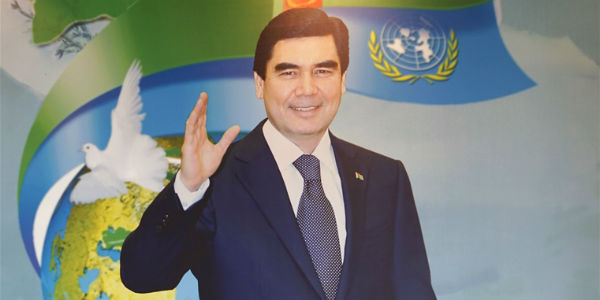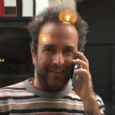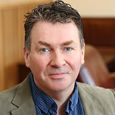Why has Turkmenistan’s despotic president created the characteristics of a democracy?
The incumbent President of Turkmenistan, Gurbanguly Berdymukhamedov, was duly elected in February with almost 98% of the vote. But why did a man with such a firm grip on power – he has ruled since 2007 – bother to hold elections at all? Why take the risky step of allowing other candidates to run and creating an (admittedly powerless) opposition? Abel Polese and Donnacha Ó Beacháin (Dublin City University) explore the possible reasons why Berdymukhamedov has created a facade of political pluralism.

A five-metre tall cardboard model of Berdymukhamedov greets visitors to the Turkmenistan pavilion at Expo Milan 2015. Photo: Jean-Pierre Dalbera via a CC bY 2.0 licence
Why would a country that has never held multi-party elections, or elections in the proper meaning of the world, all of sudden decide to hold presidential elections, allow candidates, and parties, to register and move towards political pluralism – all for no apparent reason?
In power since Niyazov’s death in 2006, Gurbanguly Berdymukhamedov has an impressive record of alleged popularity in the country. On state media he is depicted as a sportsman and as a master of numerous physical disciplines, including horse riding, car racing, cycling and weight lifting. He is author of over 30 books on a variety of subjects. In October 2011, he was given the title ‘Hero of Turkmenistan’ and in 2015 a 21m gold-covered bronze sculpture of Berdymukhamedov on a horse was unveiled in the capital, Ashgabat.
Then Turkmenistan announced that at the February 2017 presidential election candidates from outside the president’s party (the Democratic Party of Turkmenistan) would be allowed to run. A law allowing the formation of political parties was adopted in 2012, and the Party of Industrialists and Entrepreneurs was created in time to contest the 2013 parliamentary elections. It was followed by the establishment of the Agrarian Party in September 2014. These parties are the progeny of the presidential administration and in no way rivals of each other.
Subsequently, on 12 February 2017, Berdymukhamedov was re-elected president of Turkmenistan with 97.7% of preferences and an implausibly high turnout of 97.28%.
Why did Turkmenistan create a façade of political pluralism? Both formally and informally, the president has covered all options. Turkmenistan is a presidential republic with official separation of powers between the executive, the legislative and the judiciary enshrined in the Constitution. However, Berdymukhamedov can sack ministers, regional governors, majors and members of the judiciary at will, including the Supreme Court.
The president’s move appears illogical from the standpoint of political survival (see The Logic of Political Survival). Why was all this needed? Why would Turkmenistan need to invest so much money, time and effort to this exercise? Even more interestingly, why take the risk? The new political parties depend, in one way or another, on the regime so one could assume that not much would change. But by creating alternative spaces endorsed, at least officially, by those in power, a regime can provide the opposition with a legal basis to develop alternative ideas and approaches.
After all, even single-party regimes are not immune from dissidence viruses. Think of Tiananmen Square in 1989 and the internal conflict between the reformist and conservative wings of the Chinese Communist Party. In that case the conflict was solved internally by expelling the reformists from the party. But would it have been possible to sack them so easily had they belonged to a different party?
In Turkmenistan a de jure but not de facto opposition now exists. Still, the carcass is there, waiting for a hermit crab to occupy it if the opportunity arises. Why provide such an opportunity? Why take such a risk? And why spend money to do it? We can guess at a few strategic considerations that might have informed the desire to develop pluralism, or at least the impression of pluralism, in the country.
PR and promotion of the current president masqueraded as elections. The state did not only cover the cost of the elections but also of election campaigns of the candidates and managed their TV, radio and press appearances. However, during the electoral campaign, state media were keener to publicise Berdymukhamedov’s ability to rule than to describe and explain his objectives for his next term.
The electoral campaign avoided any mention of economic hardship, which might have undermined presidential authority. There are no alternative data regarding the president’s domestic popularity, but it is possible that the last elections were an attempt to show that he was not only popular in absolute terms (what would be a Soviet-style plebiscitary election) but also in competition with anyone in the country (as happens in Western elections where candidates compete with each other).
International consensus. In spite of an official policy of neutrality, Turkmenistan has made attempts to secure some support at the international level. Although most world leaders were indifferent to the results, the presidents of Turkey (Reccep Tayyip Erdoğan), China (Xi Jinping) and Russia (Vladimir Putin) congratulated Berdymukhammedov. By the same token, CIS election observers praised the openness and transparency of the Turkmen elections. Although it has not been admitted to the club of democratic countries, this kind of support allows Turkmenistan to enter the club of “alternative democracies” – that is, countries officially endorsing democratic principles but with a twist of exoticism, leavened by local values and allegedly respectful of local culture, history and traditions.
Safety and continuity. A victory with a façade of legitimacy allows the president to consolidate his position domestically and internationally until the next elections, which are not due before 2024. Many things might have happened by then. Does Berdymukhamedov plan to retire in 2024, when he will be 66? He has diabetes. A Plan B might already be under consideration. In November 2016, just three months before the presidential contest, Berdymukhamedov’s only son, Serdar, was elected to Turkmenistan’s 125-member parliament, the Mejilis. This could allow him to hold on, formally or informally, to his power.
Where is this leading? We must wait and see. After all, as Niels Bohr said, prediction is very difficult, especially about the future. Alternative forms of democracy are growing increasingly popular across the world. The Turkmen case will certainly be worth watching in the coming years.
This post represents the views of the authors and not those of Democratic Audit.
 Abel Polese is senior research fellow at Dublin City University and Tallinn University of Technology.
Abel Polese is senior research fellow at Dublin City University and Tallinn University of Technology.
 Donnacha Ó Beacháin is Associate Professor and director of research at the School of Law and Government, Dublin City University.
Donnacha Ó Beacháin is Associate Professor and director of research at the School of Law and Government, Dublin City University.





 Democratic Audit's core funding is provided by the Joseph Rowntree Charitable Trust. Additional funding is provided by the London School of Economics.
Democratic Audit's core funding is provided by the Joseph Rowntree Charitable Trust. Additional funding is provided by the London School of Economics.
[…] Why has Turkmenistan’s despotic president created the characteristics of a democracy? […]